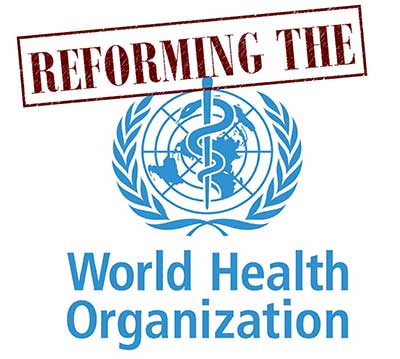Relevance: GS-2: Important International institutions, agencies and fora- their structure, and mandate.
Key Phrases: World Health Organization, COVID-19 summit, West Africa Ebola epidemic, Strong sanctions, Narrow mandate, Increased untied funding, Open governance, Broad technical expertise, Democratic coalition.
Context:
- In the third year of the COVID-19 pandemic, Prime Minister of India once again brought up the much-discussed issue of reforming the World Health Organization while addressing the heads of countries at the second global COVID-19 summit. What reforms are urgently needed to strengthen the global health body and its ability to respond to novel and known disease outbreaks in order to limit the harm caused to the global community is beyond debate.
World Health Organization
- Founded in 1948, WHO is the United Nations agency that connects nations, partners, and people to promote health, keep the world safe and serve the vulnerable – so everyone everywhere can attain the highest level of health.
- There are 194 Member States, 150 country offices, and six regional offices.
- It is an inter-governmental organization and works in collaboration with its member states usually through the Ministries of Health.
- The member states of the WHO appoint delegates to the World Health Assembly, which is the supreme decision-making body. The World Health Assembly is attended by delegations from all Member States and determines the policies of the Organisation.
- The WHO is headed by its Director-General and is headquartered in Geneva.
Need of Reforms:
- In 2015, after the World Health Organization’s delayed response to the West Africa Ebola epidemic amplified that crisis, some experts called for dismantling the health agency. Many times there were many critics of WHO, the most vocal critic of all, was former U.S. President Donald Trump, who decided to withdraw his country from the organization. The 72-year-old organization’s relevance is once again questioned in the midst of a historic pandemic.
- The long delay and the reluctance of China to readily and quickly share vital information regarding the novel coronavirus, including the viral outbreak in Wuhan, and its stubborn refusal to allow the global agency to investigate, freely and fairly, the origin of the virus has highlighted the need to strengthen WHO.
- For several years, the mandatory contribution has accounted for less than a fourth of the total budget, thus reducing the level of predictability in WHO’s responses; the bulk of the funding is through voluntary contribution. Importantly, it is time to provide the agency with more powers to demand that member states comply with the norms.
How to Reform the WHO:
There are many ways that explore how to reform the institution:
- Strong sanctions: Unable to assert authority, WHO has to rely on soft power strategies to gain countries’ cooperation, leading to many of the criticisms the organization receives. The International Health Regulations currently mandate that governments report any “public health emergencies of international concern” and cooperate with WHO to take action, but WHO has no legal ability to enforce this. The regulations must be reformed to include enforceable sanctions against countries that fail to comply with their mandate.
- Experts often cite the World Trade Organization as an example of an international organization with the ability to impose sanctions on its member countries when they fail to abide by its rules.
- Narrow mandate: WHO’s mandate must be clarified and narrowed. The organization has a very broad scope — in theory, all activities that can improve the health of all populations worldwide are under its purview. Instead, WHO should focus primarily on activities where it can bring the most added value.
- Increased untied funding: Many experts have pointed to WHO’s limited budget, which is less than the budget of many major U.S. hospitals, as the main culprit for its current failings. The share of unearmarked funding is also ridiculously low, with membership dues representing less than 20% of the agency’s total budget.
- Open governance: Alongside its budget, the governance of WHO must also be reformed to facilitate the inclusion of alternative voices, such as from the civil society, and to better channel the influence of private philanthropists.
- Broad technical expertise: Finally, WHO must maintain its technical focus but broaden its expertise to include more input from political scientists, urban designers, lawyers, logisticians, or information technology specialists. While the technical focus of the organization can legitimate its public health recommendations and ensure its diplomatic impartiality, bringing new technical expertise on board can expand the organization’s authority on topics that are outside the public health realm but have a strong impact on it, such as digital technologies or social determinants of health.
Way Forward:
- None of these reforms will be easy to implement. They will require a strong commitment from and extensive coordination between member states in a time of significant economic recession and increased nationalism.
- Unless a strong democratic coalition of countries emerges to push for these reforms, they are unlikely to happen. But a wider reflection on the role of WHO is necessary to ensure that the next time a public health threat emerges, the world has a strong global health agency to confront it.
Source: The Hindu
Mains Question:
Q. What is the mandate of the World Health Organisation? Why there is a need to reform World Health Organisation? Critically Examine.








